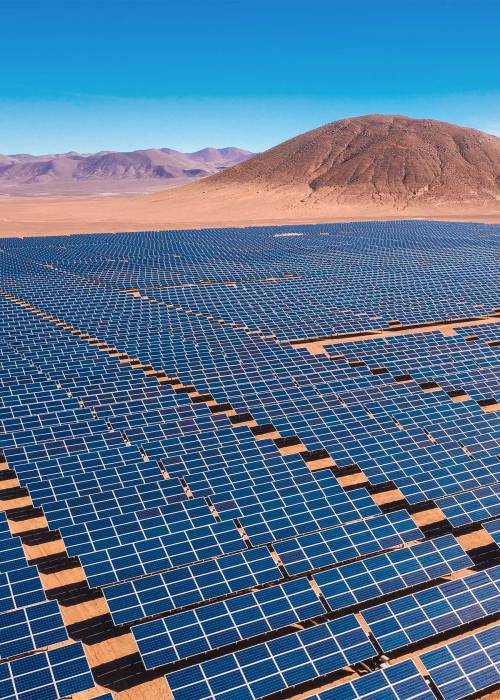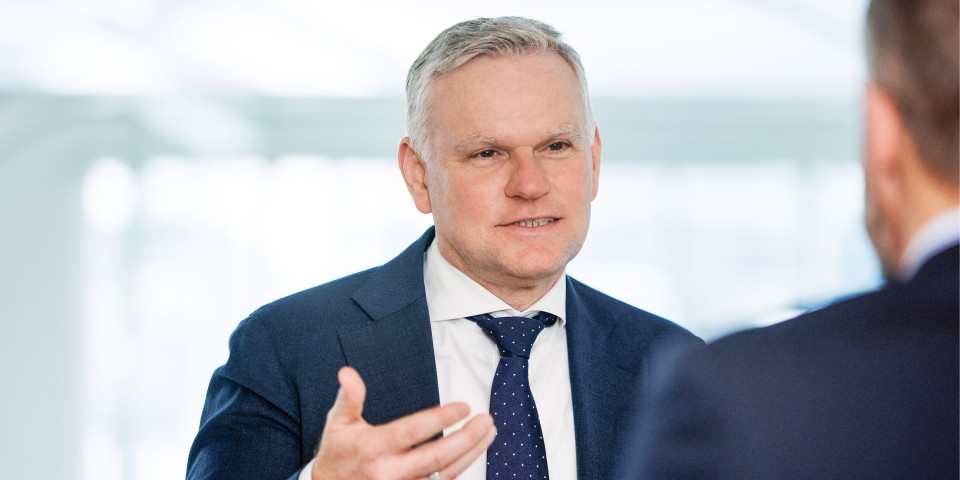May 26, 2020 Read time: approx. MinutesMinute
“We Are True Pioneers”
WACKER Executive Board member Auguste Willems discusses climate protection, customer needs and the intimate, decades-long link between ecological and economic factors within the Group’s integrated production system.
What Are Some Signs that Sustainability is an Important Issue for WACKER?
First of all, you can tell by the goals we have set for our production processes: one of our five strategic corporate objectives is to increase our emphasis on sustainability. To do that, we intend to reduce our specific greenhouse gas emissions by one-third by 2030 and cut our specific energy consumption by half. Energy use and raw materials are the key levers that chemical companies have at their disposal for making production more sustainable. In its 2050 roadmap, the German Chemical Industry Association pointed out that, by 2050, energy demand in chemical production – for generating steam, for instance – will have to be met largely through electricity rather than fossil-based raw materials.
Why? Because electricity can also be generated from renewable energy sources, and doing so would significantly reduce the industry’s carbon footprint. Up to now, electricity has only fulfilled 12 percent of the energy needs of the chemical industry in Germany – 88 percent has been met by fossil resources. In 30 years, that will need to be essentially reversed.

Auguste Willems’ Executive Board responsibilities include production and sustainability at Wacker Chemie AG.
And What Exactly Do those Figures Look Like for WACKER?
WACKER already obtains 62 percent of the energy it needs from electricity – just 38 percent is drawn directly from fossil resources. That puts us in an outstanding position to become one of the first chemical companies in Germany to achieve carbon-neutral production. For that to happen, of course, the electricity mix will one day have to be based primarily on renewable energy sources. In that respect we are true pioneers!
“By 2030, we intend to reduce our specific greenhouse gas emissions by one-third and cut our specific energy consumption by half.”
– Auguste Willems, member of Wacker Chemie AG’s Executive Board
So Far, We’ve Talked About Production Processes. But How Does the Issue of Sustainability Play Out in Our Business Processes?
We have organized our company’s business principles into five codes. One of these, the Code of Sustainability, lists principles for sustainability that, in addition to guiding our R&D, production, products, procurement and logistics, specify the nature of our social commitments. The same holds true for the partners we work with: we expect them to do more than just follow relevant laws and regulations – we require compliance with our high environmental, health and safety standards as well. As part of our Together for Sustainability initiative, we are working with 25 other chemical companies to assess environmental and social standards throughout our supply chains and to make strategic improvements that ensure responsible procurement of goods and services.

During their anticipated service life of 30 years, photovoltaic modules supply much more electricity than WACKER needs to manufacture the polysilicon as base material in the first place.
And How Do Our Products Reflect the Importance of Sustainability?
Here I would point to WACKER Sustainable Solutions – a program that aims to make our product portfolio increasingly sustainable. By 2030, we expect 90 percent of our portfolio to consist of products that at least meet – but better yet, exceed – sustainability criteria. Our two largest business divisions, WACKER SILICONES and WACKER POLYMERS, already offer products that are not based on fossil resources – BELSIL® eco, VINNAPAS® eco and VINNECO® are instead manufactured from renewable raw materials. More and more businesses, such as those in the cosmetics industry, are demanding products like these, and we can meet the needs of those markets. That makes us a true pioneer in the chemical industry.
Our WACKER Sustainable Solutions initiative requires us to examine our entire portfolio and ask how each of these products contributes to the sustainability of the final application. Take, for example, our VAE polymers, which allow customers to use efficient thin-bed mortars that require only a quarter of the cement needed in unmodified, thick-bed systems. And because cement production releases a great deal of CO2, this, in turn, improves the carbon footprint of mortar products. When used in the base coat of external thermal insulation composite systems, dispersible polymer powders based on VAE also bond the ETICS to the wall, which helps save energy. Or take electric vehicles, for example: the motor, battery and power electronics require efficient heat management. Thermal interface materials based on silicone are ideal for that.
Did Sustainability First Become a Significant Issue Once Global Warming Began to Enter the Public Debate?
Not at all. Sustainability is absolutely nothing new for us. We’ve been operating a finely balanced, highly interdependent integrated production system at our Burghausen site for decades, and we’ve now applied those principles to building a global production network. Integrated production means taking the by-products from one production stage and feeding them back into the process as starting materials for other products. Necessary auxiliaries such as hydrogen chloride flow in a closed loop and are nearly fully recovered. We collect the heat from production and use it in other processes, which conserves resources and energy while preventing waste. Ecological and economic factors really do go hand in hand in this integrated production system – and they have done so for decades.
The public debate has most definitely been part of why WACKER has been redoubling these efforts, however. One example here is how we have intensified our role in the circular economy outside of our own production network, working with our customers to explore ways of collecting and recycling our products once they have been used. We are also conducting biodegradability studies on our products. And when it comes to climate protection specifically:
Can a Private-Sector Company Like WACKER Help Germany and the European Union Reach Their Political Goal of Carbon Neutrality by 2050?
Of course. The public sees global warming as a special threat – with good reason. And a span of 30 years is not a long time for reaching our goal of carbon neutrality. As the world’s leading producer of polysilicon for photovoltaic modules, WACKER and its highly efficient production system have a significant contribution to make – after all, the energy transition and the goal of carbon neutrality will likely remain out of reach without solar energy. On the other hand, initiatives like the UN’s 17 sustainable development goals clearly show that sustainability is about more than protecting the climate and the environment: sustainability encompasses social and economic factors as well. This means that WACKER also needs economic incentives – market demand, for instance – to develop exceptionally sustainable products.
“Our aim is to use our products to help Germany and the European Union meet their political goal of achieving carbon neutrality in 2050.”
– Auguste Willems, member of Wacker Chemie AG’s Executive Board
To What Extent Does WACKER Need Support from Policy Makers in Its Efforts to Improve Sustainability?
For starters, WACKER runs an energy-intensive business. Our polysilicon production requires a great deal of electricity, yet the solar panels manufactured from this polysilicon generate many times more electricity than this in the next stage of their life cycle – and they do so with a net zero carbon footprint. As a general rule of thumb, modern photovoltaic modules have generated more electricity in their first year of operation than was needed for manufacturing them in the first place (this includes the polysilicon as base material). That depends heavily, of course, on the amount of sunlight in the location where the modules are installed. But with an anticipated service life of 30 years, the carbon footprint of a solar panel and the polysilicon on which it is based is excellent on the whole.
Electricity prices in Germany are currently up to four times higher than they are for our Chinese competitors, however, and phasing out coal here will drive those prices up further. If energy-intensive, forward-looking technologies like polysilicon manufacturing move to China because high electricity prices make production in Germany no longer competitive, then we are ultimately going to see a massive increase in greenhouse gas emissions. After all, production in China uses far more electricity from coal than is the case here, and energy consumption in Chinese production plants is nowhere near as optimal as it is in Germany. That can’t be compatible with climate protection, especially since future jobs in an up-and-coming industry are also at stake. This is where government is needed to strike a balance between environmental, business and social needs – a balance that is reasonable and that will be workable over the long haul.








